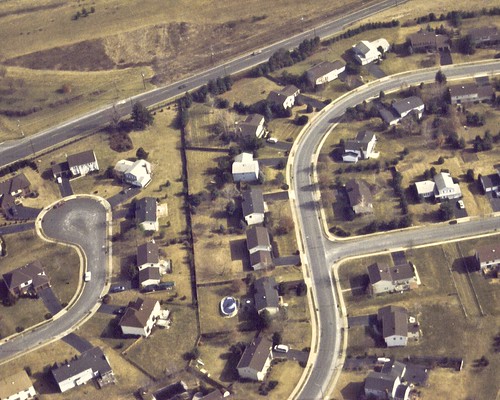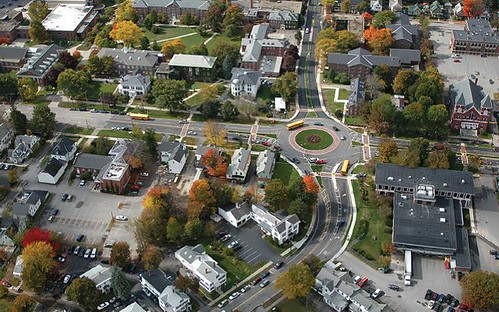Building resilient cities and towns with fiscal conservatism

Posted October 4, 2011 at 1:24PM
It will not be news to anyone who is reading this that the United States remains in the midst of the deepest economic crisis in my lifetime. (I guess it turns out that you can’t start two major wars while cutting taxes and failing to regulate financial institutions, at least not without paying a steep price. Surprise.) Getting out of this mess and becoming more economically resilient will require a basket of solutions, including a serious look at the way we have been growing our cities and towns.
Indeed, my friend Charles Marohn and his colleagues at the Minnesota-based nonprofit Strong Towns have made a very compelling case that suburban sprawl is basically a Ponzi scheme, in which municipalities expand infrastructure hoping to attract new taxpayers that can pay off the mounting costs associated with the last infrastructure expansion, over and over. Especially as maintenance costs increase, there is never enough to pay the bill, because we are building in such expensive, inefficient ways.
This week, Strong Towns has released a substantial new report analyzing data and arguing that we must change our development approach if we wish to end the current economic crisis. In particular, we must emphasize obtaining a higher rate of financial return from existing infrastructure investments, focusing on traditional neighborhoods where large public investments in infrastructure are currently being underutilized.
The report is called Curbside Chat: A candid talk about the future of America’s cities, towns and neighborhoods, and it is available for download from the Strong Towns website.  It is written for a general audience and is highly accessible. The title comes from Marohn’s popular presentations, some of which are archived on the site as podcasts (including one from a very interesting conference about small towns on Maryland’s Eastern Shore, where I was also a speaker.)
It is written for a general audience and is highly accessible. The title comes from Marohn’s popular presentations, some of which are archived on the site as podcasts (including one from a very interesting conference about small towns on Maryland’s Eastern Shore, where I was also a speaker.)
Curbside Chat analyzes the roots and realities of our financial predicament in some depth. Among its insights is that, as dismal as the current national housing market seems to be, in some ways the market for commercial properties is even more problematic, because of the shorter-term loans typically asssociated with commercial financing. And, to compound whatever problems the private sector is experiencing, the public sector is facing acute shortages of fiscal resources at all levels of government. The authors argue that these circumstances require a set of "rational responses" that stress efficiency and value creation in already-built areas, instead of unchecked expansion on the suburban fringe.
In particular, in the report and an accompanying press release, Strong Towns calls on local officials to change course and shed the “dead ideas” of the suburban era, including these:
- That local governments can grow without considering the public’s return on investment. Being blind to the financial productivity of our places has led to inefficient use of public infrastructure investments and allowed local governments to assume overwhelming, long-term financial obligations for maintaining infrastructure.
- That local budget problems can be solved by creating more growth. More growth in the same unproductive pattern will only increase our economic problems. What is needed is an approach that improves our use of existing infrastructure investments.
- That attracting a large employer is the key to local economic prosperity. In an age of globalization, this strategy may provide short-term gains for some local governments, but it is ultimately a race to the financial bottom.
- That property owners can develop their property as they see fit while at the same time obligating the public to maintain the new infrastructure. This type of indirect subsidy creates enormous long-term financial obligations for taxpayers, increasing local taxes and reducing local competitiveness.
The authors then recommend a number of specific strategies:
- A stop to infrastructure projects that expand a community’s long-term maintenance obligations.
- A full accounting of all short and long-term financial obligations local governments have assumed for maintaining infrastructure.
- The adoption of strategies to improve the public’s return on investment and improve the use of existing infrastructure.
- Large-scale changes in local zoning regulations to streamline approval processes and provide the necessary regulatory flexibility within existing neighborhoods.
- Significant changes in the standard engineering approach to road and street design, shifting emphasis away from increasing automobile-oriented mobility and toward increasing pedestrian mobility within neighborhoods while eliminating accesses and intersections along auto corridors.
Marohn feels strongly about these things, but he is about as far from a radical as you can get. He is fundamentally a soft-spoken, common-sense Midwesterner’s Midwesterner, and a fiscal conservative. But it is precisely that conservatism that has driven his organization's philosophy in the direction of smart growth policies and supporting traditional towns and neighborhoods.
As someone who entered the world of environmental policy through the door marked conservation, I can relate, and I suspect others can, too.
Move your cursor over the images for credit information.

